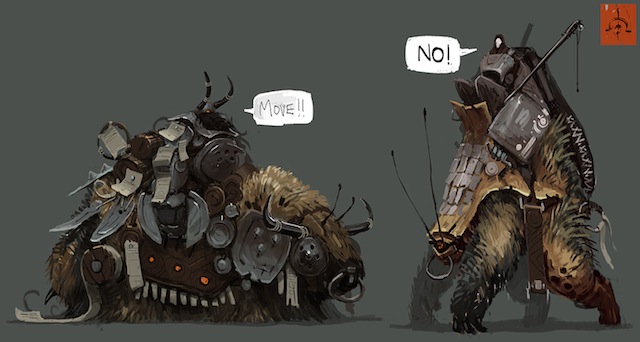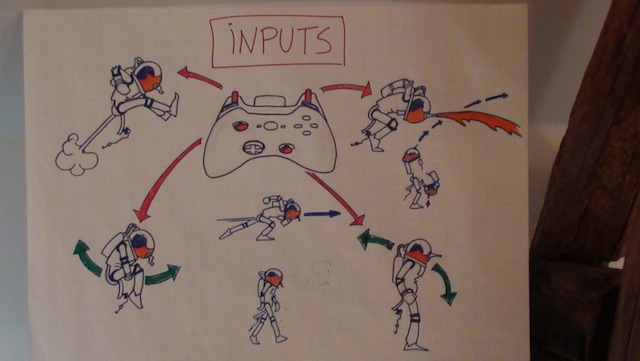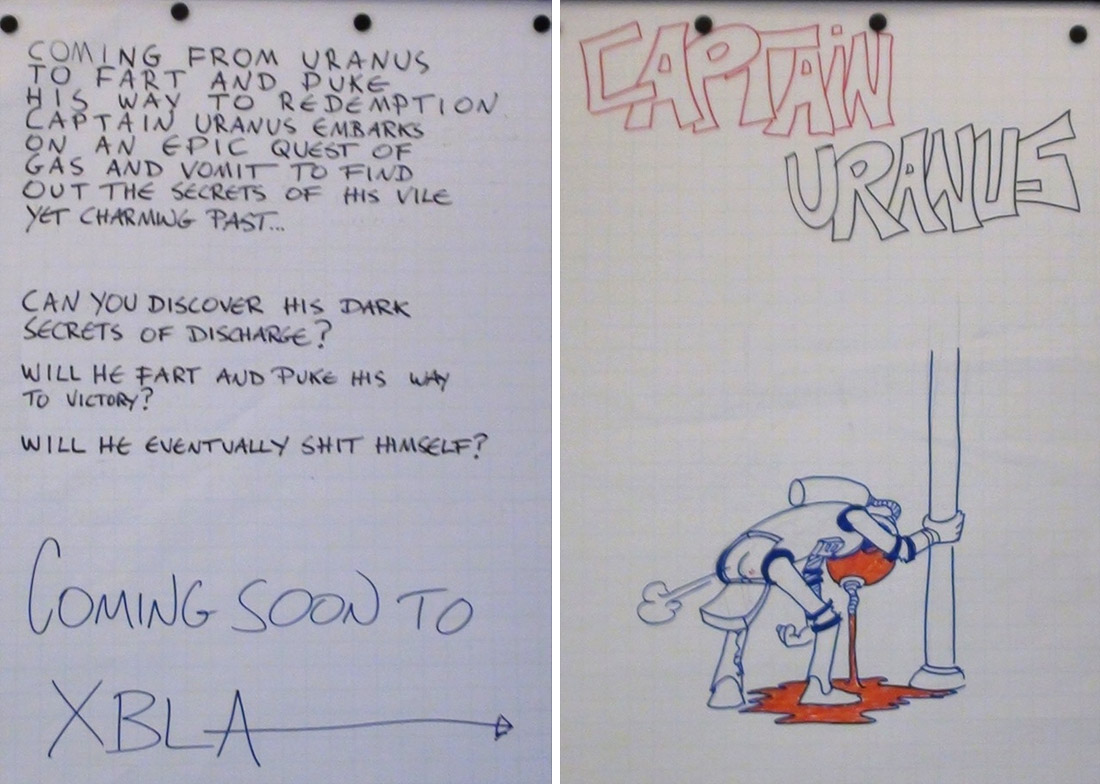/cdn.vox-cdn.com/uploads/chorus_image/image/27345531/spleen.0.jpg)
The Far Cry 3: Blood Dragon creative director isn't finished shaking up games with his distinctive brand that's colorful, creative and sometimes crude
"I am working on a project," Evans tells me excitedly. His enthusiasm is palpable; the strain in his voice sounds like he's going to burst. "I am in the process of building my dream team."
Evans, who dared to dream with last year's Far Cry 3: Blood Dragon, a standalone downloadable title that re-skinned the original Far Cry 3 into a neon laser paradise of cyborgs and dragons, is in the process of moving his team into a new studio in Montreal, offices formerly occupied by THQ. There, Evans says he and his dream team are glad to have a "new consecrated space they can play with."
"This is the dream project," Evans says. "It's the one all of us have always wanted to make and it seems like they're gonna let us do it."
Evans says he's working with Ubisoft's Darren Bartley — whose DeviantArt page sports sketches of cyborgs, mechs and ghouls — as his concept artist. Art direction is being done by a well-known industry veteran — whom Evans can't name just yet — whose previous works include AAA stealth and third-person shooters and Evans says is an expert on 1980s and 90s aesthetics. This is a good first sense of the game he is working on.

"I am very, very happy," he says — his words are smiling. "These are two guys I've wanted to work with for a very long time. And because of how Blood Dragon went down, I've got the trust from the guys upstairs [at Ubisoft] to go and build a compelling and unique universe."
Evans adds that the project could still "go out the window" depending on how everything else under the company's banner performs in the months to come, but regardless, he's stoked. In addition to conceptualizing his game, he is also collaborating on a comic about "space, burgers and wrestling" with Andy Belanger, writer and artist at DC Comics and the ink behind the Kill Shakespeare graphic novel series. And of course, the comic includes cyborgs.
Evans worked at Rockstar Games for three years before moving to Ubisoft in 2007. In spring 2013, he surprised gamers with what was first thought to be an April Fool's joke and later confirmed to be a standalone spin-off of 2012's Far Cry 3. Evans' cyborg adventure was coated in an 80s action film aesthetic and unabashedly crazy. It included button actions for giving the finger, an intentionally bad sex scene and tons of f-bombs — all inspired by works created by his pal, horror filmmaker Jason Eisener. Evans wants to continue to push boundaries regarding video game content, and as he moves forward onto his new project, he is unafraid to push a few more buttons as well.
"The audience I'm interested in speaking to is people that dismiss games and don't consider themselves gamers," he explains. "There is so much we can do to bring new gamers into the fold, but we're constantly putting up barriers all the fucking time."
When players gain control of protagonist Sergeant Rex Power Colt in Blood Dragon, the first thing they must do is run through the tutorial, a set of basic command instructions like jump and run that Rex curses every step of the way.

"With Blood Dragon, the whole tutorial shit — I was like, I have to to put a tutorial in it? A tutorial should be the entire game. Blood Dragon was... fuck you guys, you want a tutorial? We'll make a shit one. We're constantly holding people's hands all the time and force-feeding tutorials and reminding people how to play games. You don't have to add a tutorial. Let's look at Minecraft. That didn't happen! DayZ. That didn't happen! And they are global phenomenons. We're humans, we're smart, we can problem solve.
"When you watch non gamers play games you see how frustrated they get when all the pop up boxes come up and you have to be reading shit all the time," he adds. "Kids playing with toys work it out for themselves, that's what's so beautiful about games like Minecraft. Work it out yourself or talk to the community."
It's games like that Evans wants to continue making, games that are aren't afraid to be self-aware, embrace toilet humor and give players the same kind of freedom to just be, like in Minecraft. Ubisoft's Design Academy, which Evans describes as a retreat in which developers "get locked in a shack and go back to school," is one of the spaces in which the company has allowed him to explore these outrageous — sometimes too outrageous — ideas. Developers are put into teams and have to design paper games, brewing ideas that could possibly become fully fleshed video games somewhere down the line.
Evans' first pitch at Design Academy was a twin-stick side-scroller called Captain Uranus. The left stick controlled the captain's head while the left trigger made him puke, and the right stick controlled his bottom half while the right trigger made him pass gas.

"He has bad flatulence and is feeling a bit sick, and you can't control how he walks, he'll do it automatically," Evans explains. "He's a little drunk and a little fucked up on multiple space narcotics. The left trigger is to puke, the right trigger is your farts, and that's how you navigate around — you have to fart on your enemies to stun them, then they open their mouths and you have to fill them with puke. You can make him walk faster by puking in front of yourself and slip."
From the way Evans describes the game, you'd think it was the soberest of titles.
Evans' second pitch was "incredibly offensive"
"As Captain Uranus, players would guide the wasted spaceman into combat against different types of aliens. The game would end with the captain approaching the final boss and sobering up only to discover he's been hallucinating the entire time — right before his wife finds him puking in a cat's litter box and kicks him out.

Evans' second big pitch, which he acknowledges was "incredibly offensive," was for an adventure game called So Jew Wanna Be a Thief? by a fake company named "Jewbisoft." Players would be put into the role of a misunderstood Hasidic Jewish man who snuck around stealing things.
"People think he's a thief and they say, 'Oh he's just stealing shit, Jews, all about his money,' but that's not it at all," Evans explained. "He's got a serious problem, he's got kleptomania."
Despite the game's questionable name and content, its stealth mechanics were serious. The game's inventory system would have been similar to that of Resident Evil or Silent Hill, with all items laid out on a grid, but with a strategic element to their organization. Players would have to be careful what items them put next to each other so they made no noise when they ran. For example, placing two bottles next to each other would cause a clinking sound that would alert security guards when running.
"I tried really hard to get that game made and of course ... that's never going to happen," Evans says. It's not surprising that a major international company wouldn't want to publish a game that uses anti-Semitic stereotypes as a punchline — but Evans is all about challenging what people find acceptable.
"I don't have any real tangible trade skills, but you know, I can rattle off ideas nonstop," he adds. "I guess my special power is exciting other people."
In this vein, Evans says he has no interest in working on traditional video games. The industry is making small strides in terms of creating unique interactive experiences — he cites Remedy Entertainment's Quantum Break as something he's looking forward to — but as a young industry, he says, it has the wiggle room to really push the envelope.
"I'm kind of tired of the name 'video games,' to be honest," he says. "This industry is so young and I don't believe we've even begun to find our true identity.
"It's inspiring to see big publishers take some risks and try and make nonconventional games," he adds, after a very long, charged, paused. "So I want to make something that's remembered. And if you look back in 20 years you'll go, 'Yeah, that was fucking awesome.'"

Video games are a truly unique storytelling medium in that they open the possibility for real, complete interactivity in ways film and television don't. Evans says reverting to older narrative techniques like delivering large chunks of story details in cutscenes and quick time events should be scrapped for more open ways players can communicate with a game world. Evans loved The Fullbright Company's Gone Home for this reason; it raised the bar for how players can pick apart a game and raised questions about naming conventions — namely, what exactly constitutes a true video game.
Part of the problem, he believes, is the lingering aftershock of the console transition and a continued need to develop for previous generation systems.
"You can't embrace the new systems and make a fully next-gen game because you have to make it through these other machines [the PlayStation 3 and Xbox 360] too," he says. "Once people get over this hump of cross-gen development, then we can really start seeing some truly innovative ideas. So many things we take for granted in film and TV that in the video game space we've never done them — things like like volumetric fog, rooms of smoke with lasers in it.
"Instead we're doing the same thing over and over again with so many games. Fuck off! We want lasers and fog and T-rexes."
Things like QTEs and cutscenes, he says, result in the "gameplay reality fighting the narrative intention." For a short while Blood Dragon also included self-aware action sequences that pointed out how these conventions could evolve into ludicrousness.
"Fuck off! We want lasers and fog and T-rexes."
"We had so many [QTEs], but we had to cut them all out," he explains. "There was a part where someone dies and you had to press A to cry, so you press A and Rex would stand and try to cry, but because he was a cyborg tears wouldn't come out."
The game included other cheeky press-button-to-emote jokes, including an actual "press A to show emotion." There was also a minigame segment in which players would have to arrange Rex's cyborg fingers into a specific shape — Evans describes it as a cross between a lewd gesture called "the shocker" and the Vulcan salute.
"Then you insert it into the ignition and pump it forward – so you're basically finger-banging a machine for a few minutes, and then it starts," he explains through laughter. "But you know how it is. Cutting room floor."
Regarding Blood Dragon having franchise potential, Evans says that although the company is "extremely happy" with its reception, another game in the series is not something Ubisoft feels it needs to rush out the door right away.
"If we do something we want to make sure we take our time with it," he says. "When working on the game, I built a universe — and that's the most amazing process to go through, your world building. And when you build a world and you build a universe that has tight logic on it, you have longevity in that."
He did note that he's currently in talks to put the Blood Dragon soundtrack, composed and performed by the band Power Glove, out on vinyl. If Evans has his way, it'll be hot pink vinyl.
"We have to pick our battles, obviously, but we can make whatever the fuck we want."
Evans describes Ubisoft as a nurturing environment, a true safe space to experiment and a company that is constantly looking for that truly unique gaming experience.
"I really, really believe in Ubisoft and the way that Yves [Guillemot] and everyone instill their trust into us as teams to deliver," he says. "And like I know that those guys want to innovate, they want to really push this industry forward, and certainly, that's all I ever want to do — is make the games I want to make. I want to make shit that's fucking nuts, things that a company and studio like this would put out.
"What drives me on is knowing that we are in an industry that's in its infancy, and we can do whatever the fuck we want, we have no limits to whatever we want to create. We have to pick our battles, obviously, but we can make whatever the fuck we want."